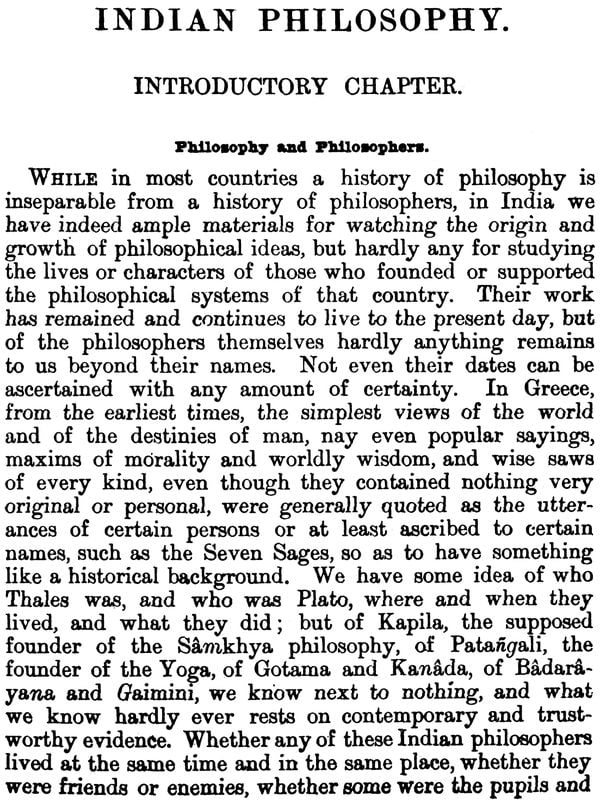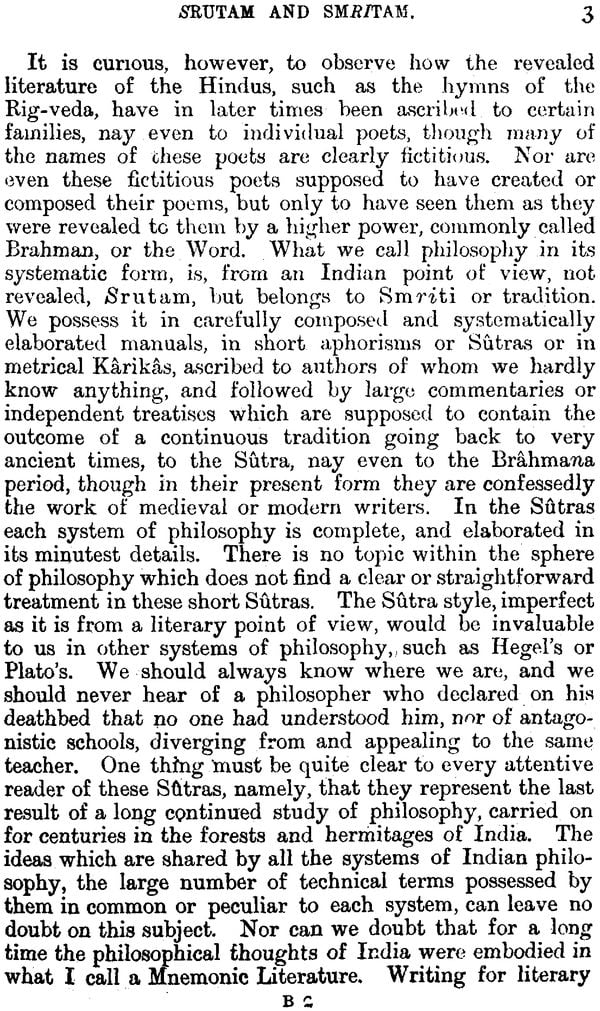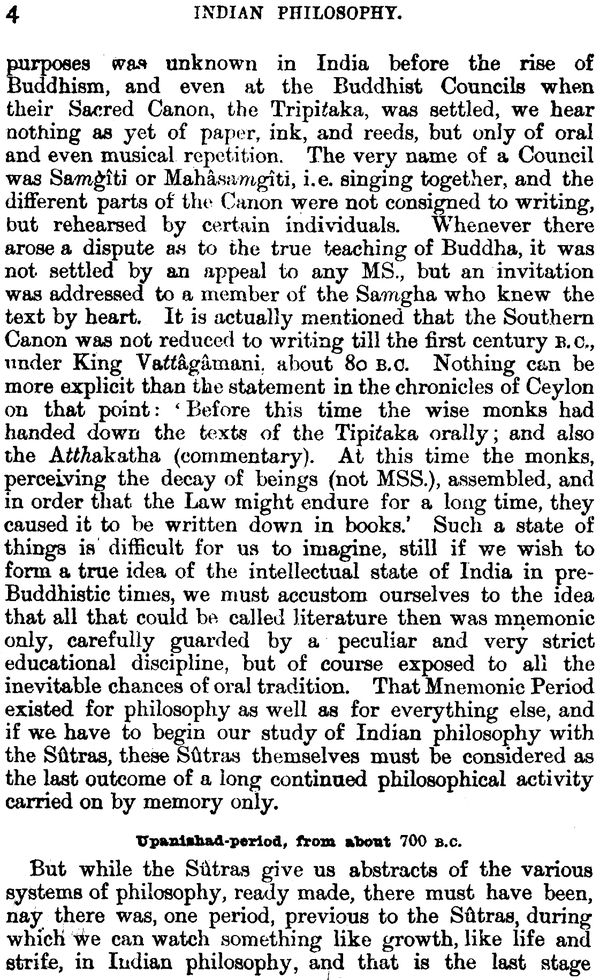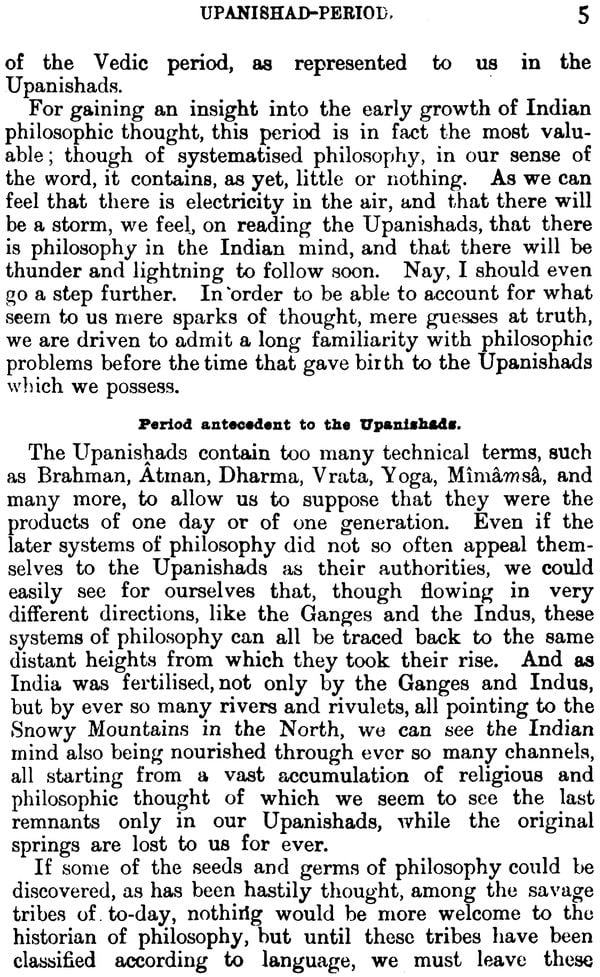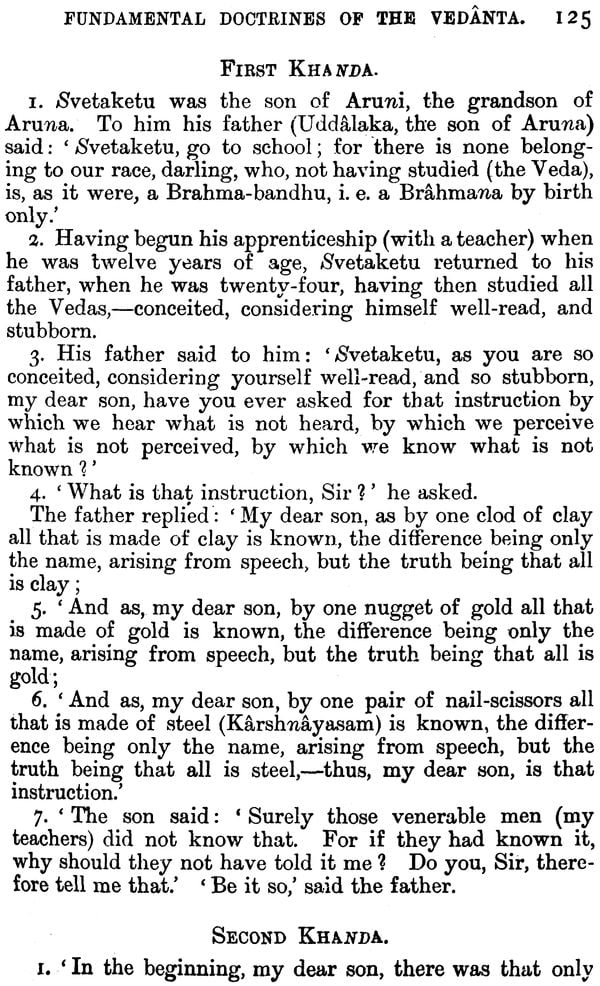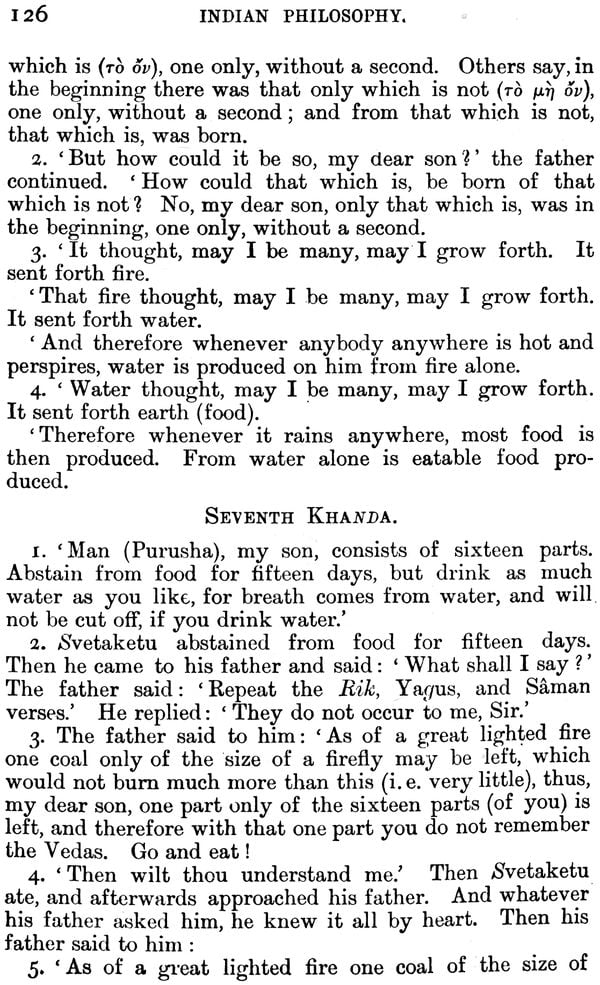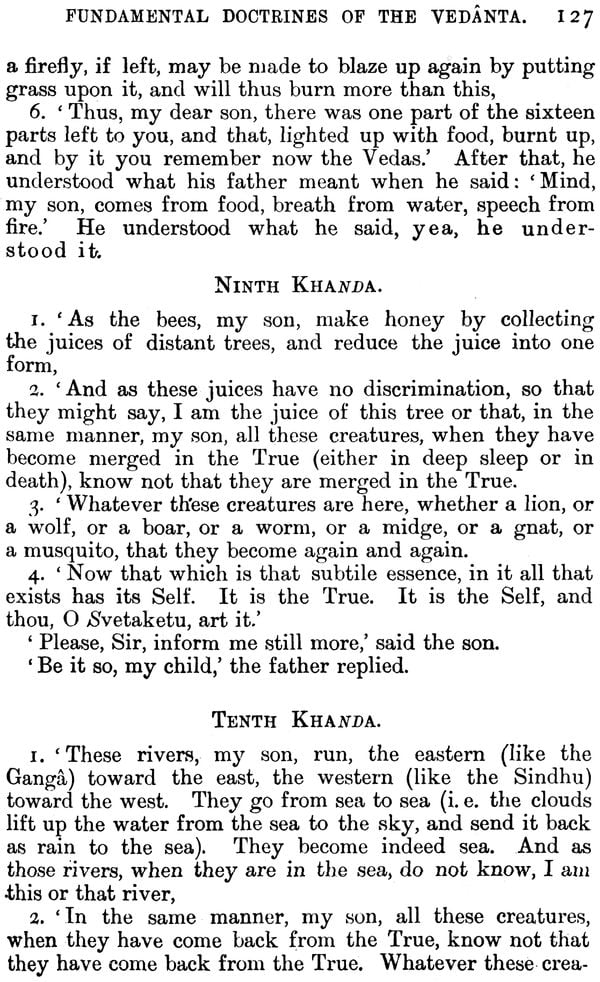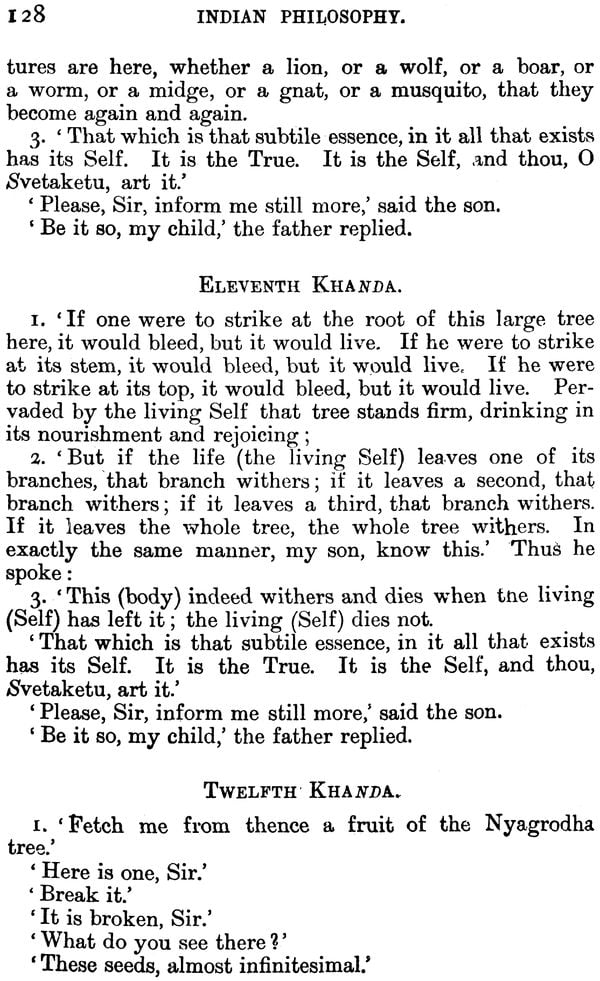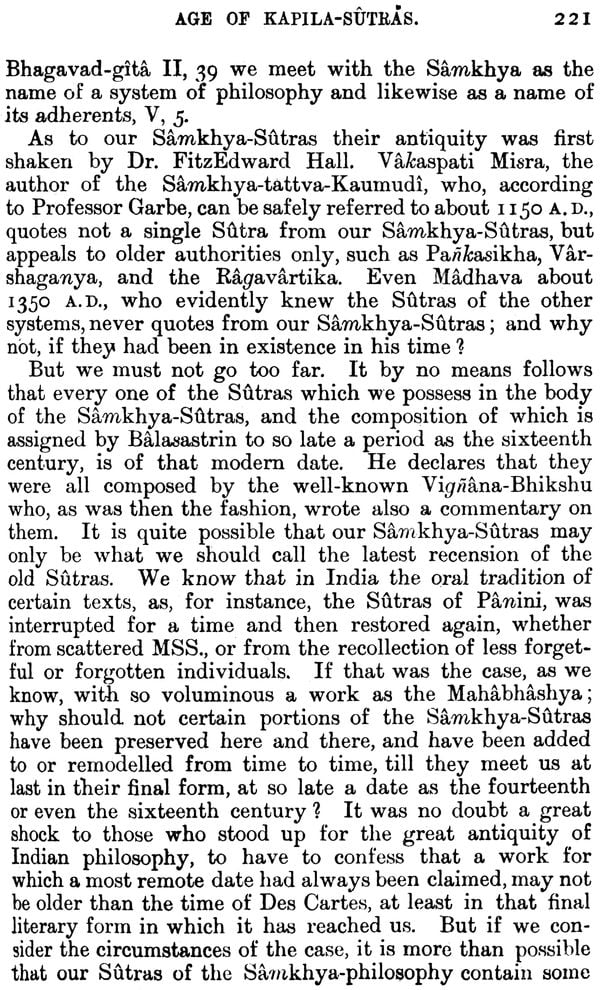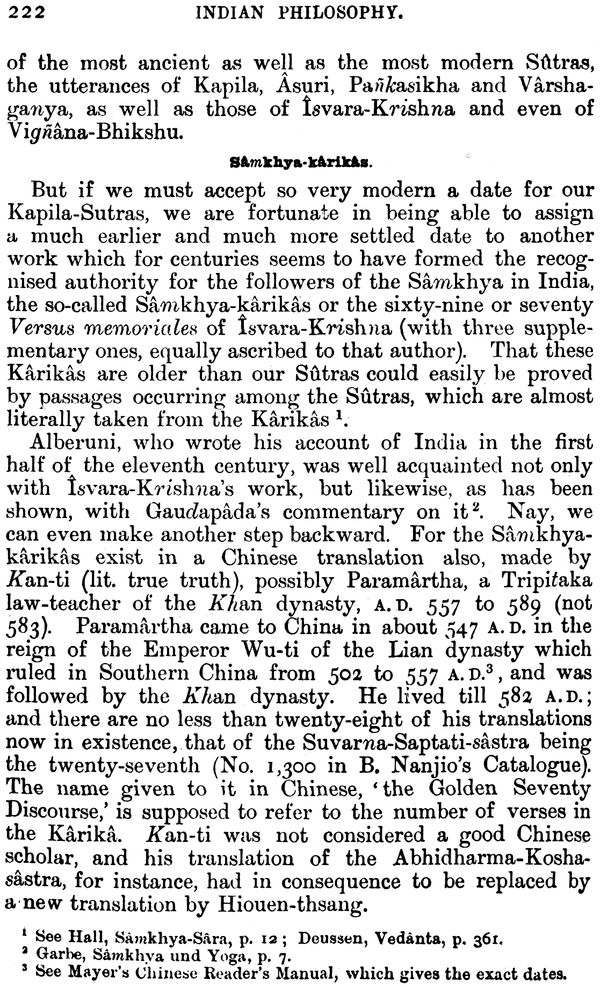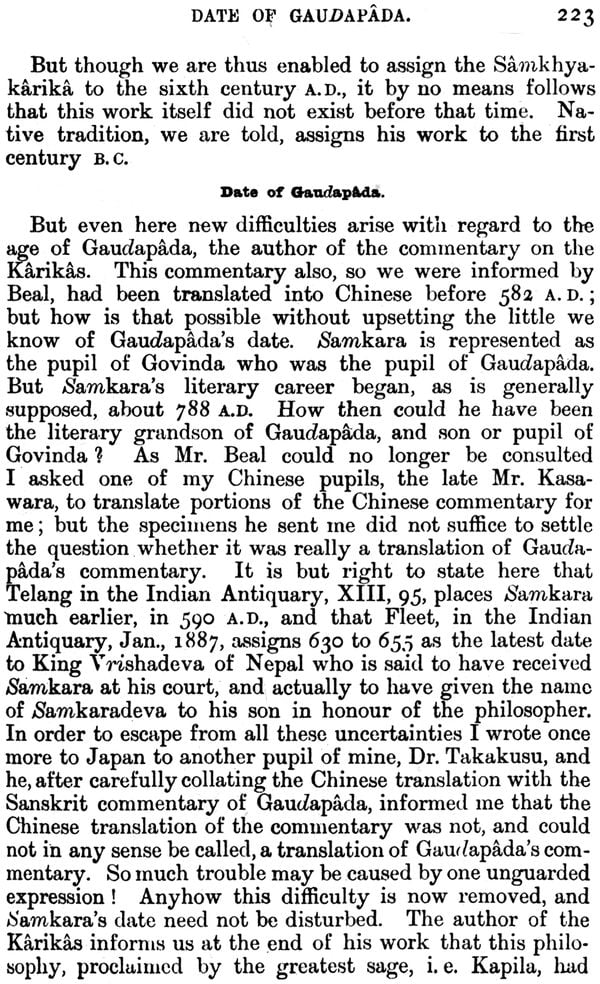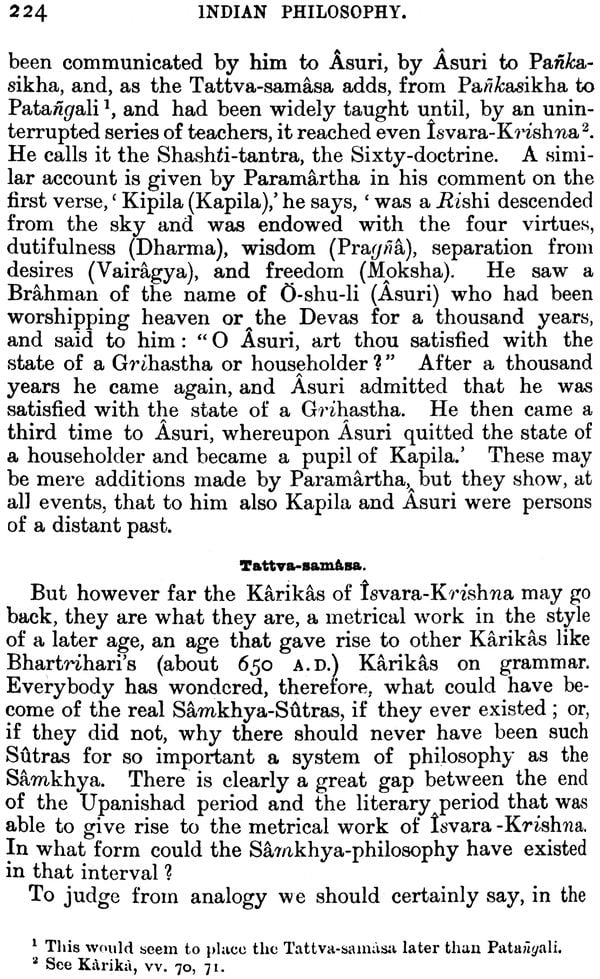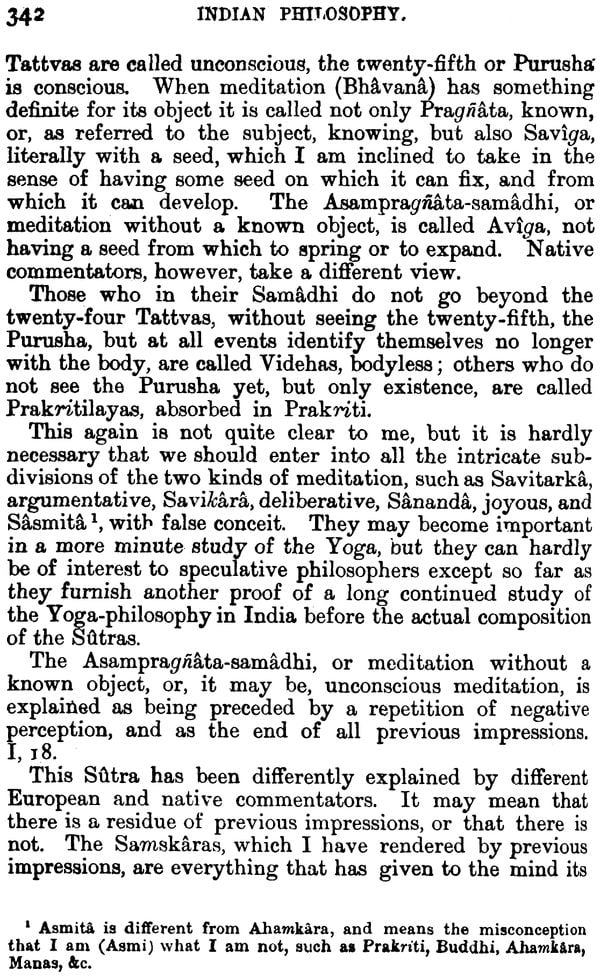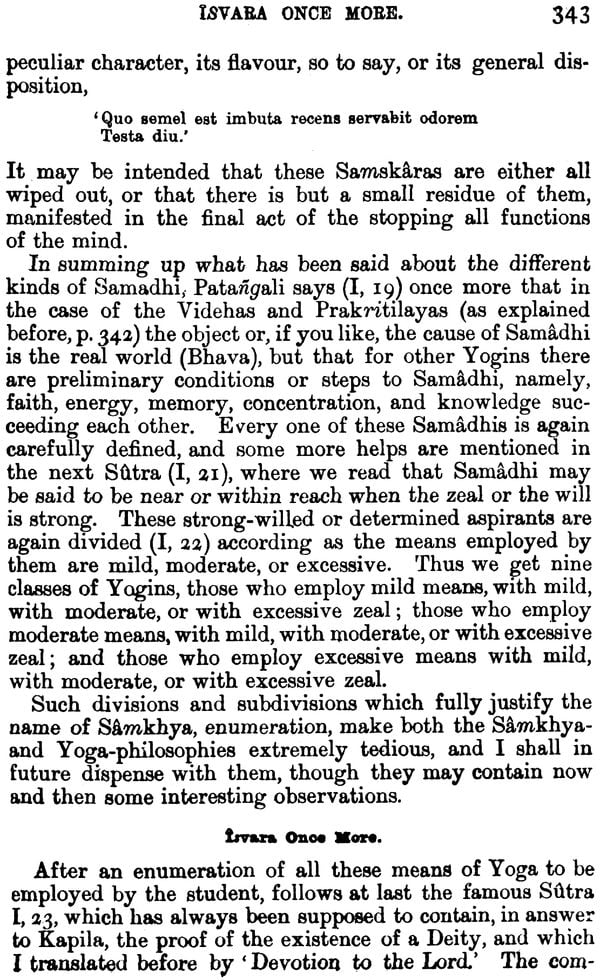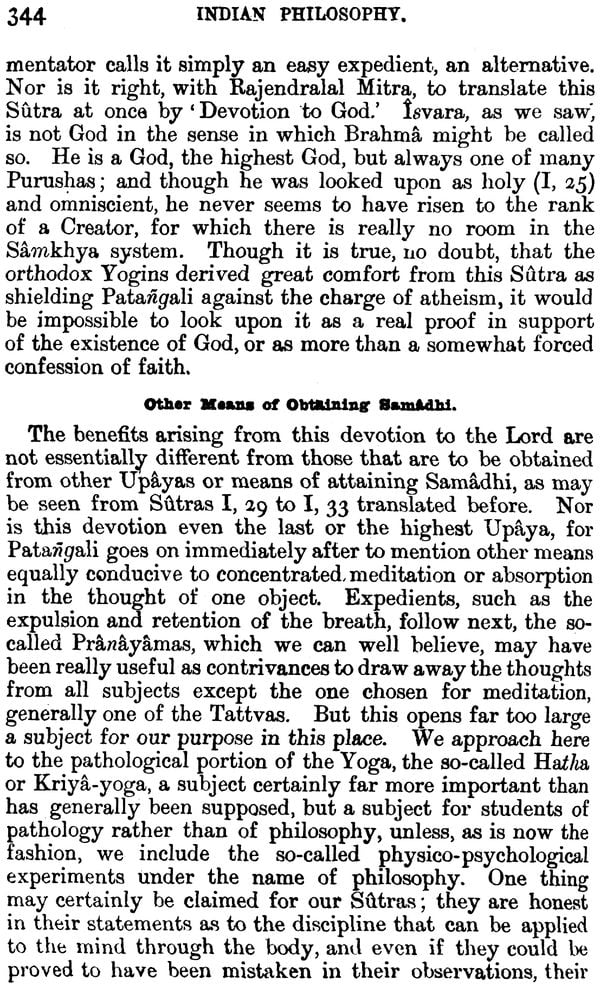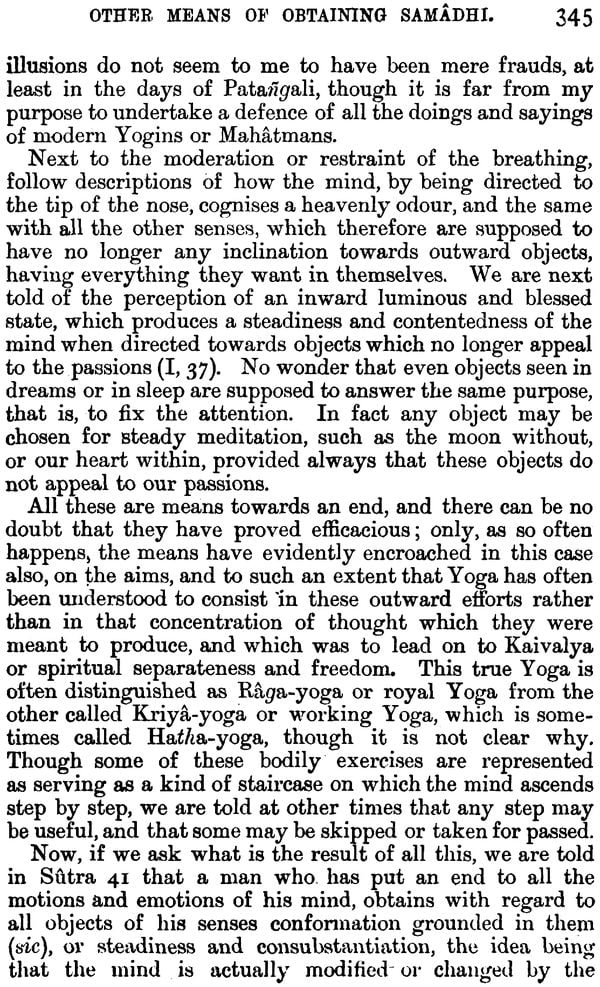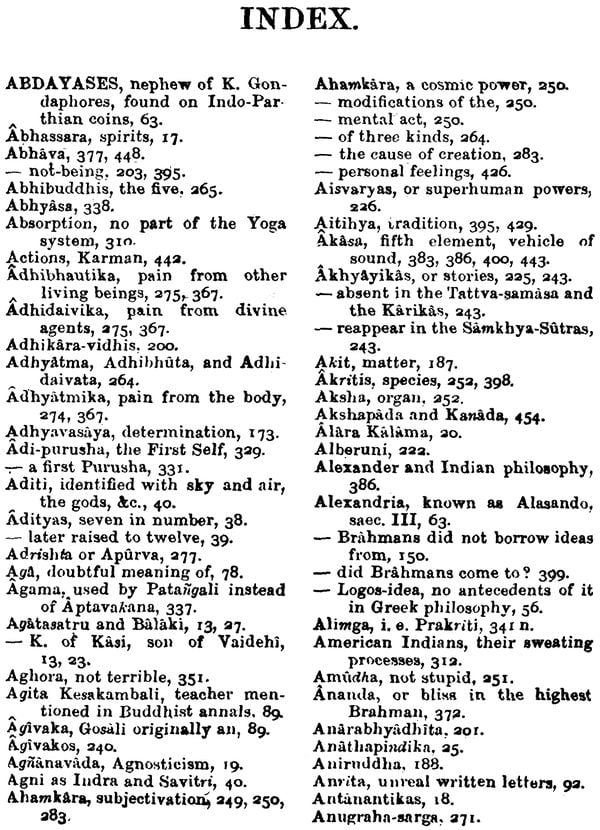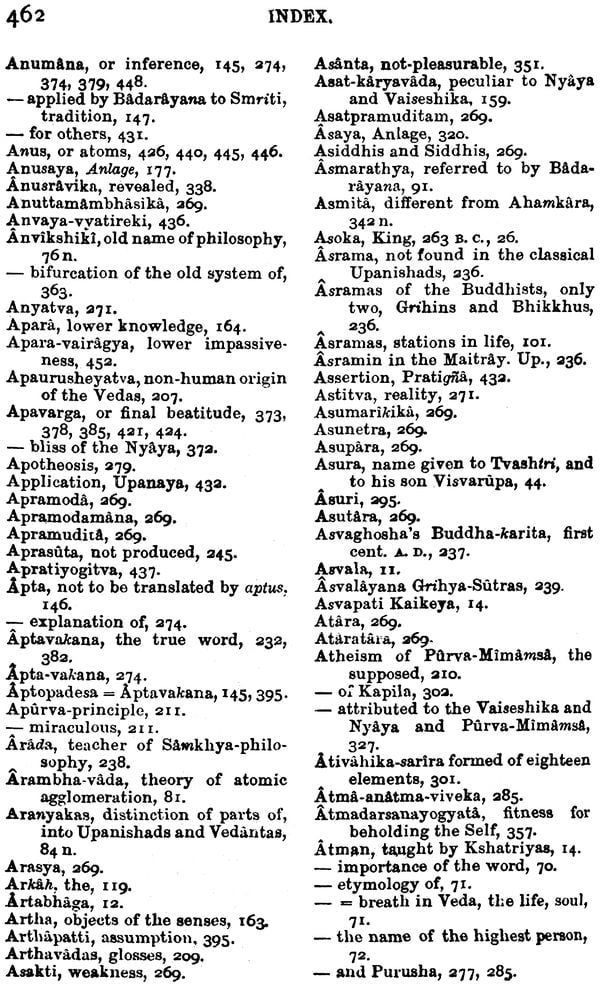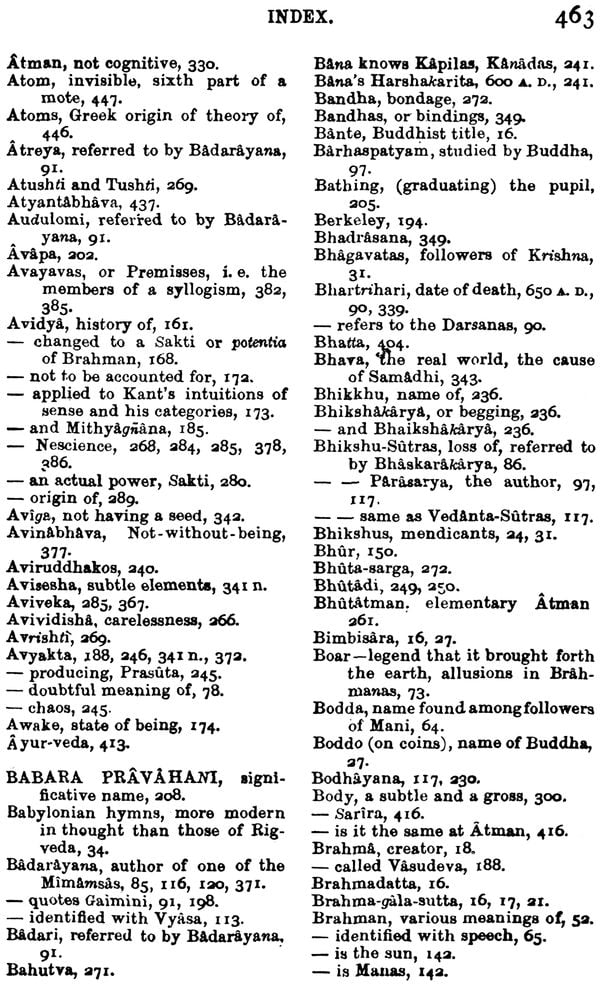
The Six Systems of Indian Philosophy -An Old Book
Book Specification
| Item Code: | IDG924 |
| Author: | Prof. Max Muller |
| Publisher: | Chowkhamba Sanskrit Series Office |
| Language: | English |
| Edition: | 2008 |
| ISBN: | 9788170800218 |
| Pages: | 478 |
| Cover: | Paperback |
| Other Details | 7.2" X 5.0" |
| Weight | 410 gm |
Book Description
Publisher's Note
During the last years we have reprinted several important out of print works all of which have been greatly welcomed by scholars and students of Indian thought. Thus encouraged we are now bringing out the present work which has been written by the most illustrious of the Orientalists form the West Prof. Max Muller.
The work deals with the Six Systems of Indian Philosophy about the greatness of which Prof. Max Muller himself observes: "it was only in a country like India, with all its physical advantages and dis-advantages, that such a rich development of philosophical thought as we can watch in the six system of philosophy, could have taken place."
With this high degree of admiration Prof. Max Muller has tried in the present work to publish the result of his own studies in Indian philosophy, not so much to restate the mere tenets of each systems, so deliberately and so clearly put forward by the reputed authors of the principal philosophies of India, as to give a more comprehensive account of the philosophical activity of our country from the earliest times, and to show how intimately not only our religion, but our philosophy also was connected with our national character.
We hope that our present effort would also be welcomed by the Scholars and students alike.
| | |
| Philosophy and philosophers | 1 |
| Srutam and Smritam | 2 |
| Upanishad-period, from about 700 B.C. | 4 |
| Period antecedent to the Upanishads | 5 |
| Intellectual Life in ancient India | 7 |
| Kshatriyas and Brahmans | 8 |
| The Evidence of the Upanishads, ganka, Agatasatru | 11 |
| Agatasatru | 13 |
| Buddhist Period | 14 |
| Prasenagit and Bimbisara | 16 |
| Brahma-gala-sutta | 16 |
| Mahabharata | 21 |
| Buddha | 23 |
| Greek Accounts | 26 |
| Buddhist Pilgrims, Hiouen-thsang | 27 |
| King Harsha | 30 |
| The Vedas | |
| The Vedas | 30 |
| The Philosophical Basis of the Vedic Gods | 35 |
| Three Classes of Vedic Gods | 37 |
| Other Classification of Gods | 38 |
| The Visve or All-gods | 39 |
| Tendencies towards Unity among the Gods | 40 |
| Henotheism | 40 |
| Monotheism and Moism | 41 |
| Pragapati | 42 |
| Visvakarman | 43 |
| Tvashtri | 43 |
| Search for a Supreme Deity | 45 |
| Hymn to the Unknown God | 46 |
| Brahman, Atman, Tad Ekam | 48 |
| Nasadiya Hymn | 49 |
| Brahman its various Meanings | 52 |
| Birth and Brahman, word | 55 |
| East and West | 58 |
| Mind and Speech | 67 |
| Atman | 70 |
| Pragapati, Brahman, Atman | 72 |
| The System of Philosophy | |
| Growth of Philosophical Ideas | 74 |
| Prasthana Bheda | 75 |
| Literary References in the Upanishads | 84 |
| The Six System of Philosophy | 85 |
| Brihaspati Sutras | 86 |
| Books of Reference | 87 |
| Dates of the Philosophical Sutras | 88 |
| Samkhya-Sutras | 90 |
| Vedanta-Sutras | 90 |
| Mnemonic Literature | 92 |
| The Brihaspati Philosophy | 94 |
| Common Philosophical Ideas | 104 |
| 1. Metempsychosis- Samsara | 104 |
| 2. Immortality of the Soul | 105 |
| 3. Pessimism | 106 |
| 4. Karman | 109 |
| 5. infallibility of the Veda | 111 |
| 6. Three Gunas | 111 |
| Vedanta or Uttara-Mimamsa | |
| Vedanta or Uttara-Mimamsa | 113 |
| badarayana | 116 |
| Fundamental Doctrines of the Vedanta | 121 |
| Translation of the Upanishads | 137 |
| Character of the Upanishads | 139 |
| Vedanta-Sutras | 140 |
| Appeals to the Veda | 143 |
| Pramanas | 143 |
| Pramanas according to the Samkhya | 144 |
| Pratyaksha | 144 |
| Anumana | 145 |
| Sabda | 145 |
| Authority of the Vedas | 149 |
| The Meaning of Veda | 149 |
| Work-part and Knowledge-part of the Veda | 151 |
| Vidya and Avidya | 152 |
| Subject and object | 152 |
| The Phenomenal Reality of the World | 154 |
| Creation or Causation | 155 |
| Cause and Effect | 156 |
| Dreaming and Waking | 160 |
| The higher and the Lower Knowledge | 164 |
| Is virtue Essential to Moksha | 166 |
| The Two Brahmans | 168 |
| Philosophy and Religion | 171 |
| Karman | 171 |
| Brabman is Everything | 172 |
| The Sthula and Sukshma-Sartra | 173 |
| The Four States | 174 |
| Eschatology | 175 |
| Freedom in this Life | 180 |
| Different Ways of Studying Philosophy | 182 |
| Ramanuga | 185 |
| Metaphors | 195 |
| Purva-Mimamsa | |
| Purva-Mimamsa | 197 |
| Contents of the Purva-Mimamsa | 200 |
| Pramanas of Gaimini | 202 |
| Sutra-style | 203 |
| Has the Veda a Superhuman Origin | 206 |
| Supposed Atheism of Purva-Mimamsa | 210 |
| Is the Purva-Mimamsa a system of Philosophy | 213 |
| Samkhya-Philosophy | |
| Samkhya-Philosophy | 215 |
| Later Vedanta mixed with samkhya | 215 |
| Relative Age of Philosophies and Sutras | 219 |
| Age of the Kapila-Sutras | 220 |
| Samkhya-Karika | 222 |
| Date of Gaudapada | 223 |
| Tattva-samasa | 224 |
| Anteriority of Vedanta or Samkhya | 229 |
| Atheism and Orthodoxy | 231 |
| Authority of the Veda | 232 |
| Samkhya hostile to Priesthood | 233 |
| Parallel development of Philosophical Systems | 235 |
| Buddhism subsequent to Upanisads | 236 |
| Lalita-vistara | 237 |
| Asvaghosh's Buddha-Karita | 237 |
| Did Buddha borrow from Kapila | 240 |
| Bana's Harshakarita | 241 |
| The Tattva-samasa | 242 |
| List of 25 Tattvas | 244 |
| The Avyakta | 245 |
| Buddhi | 246 |
| Ahamkara | 249 |
| Five Tanmatras | 250 |
| 16 Vikaras | 251 |
| 5 Buddhindriyas | 251 |
| 5 Karmendriyas | 252 |
| Manas | 252 |
| 5 Mahabhutas | 252 |
| Purusha | 253 |
| Is Purusha an Agent | 255 |
| Three Gunas | 255 |
| Is Purusha one or many | 256 |
| Vedanta Sayings | 256 |
| Early Relation between Vedanta and Samkhya | 258 |
| Traigunya | 262 |
| Samkara and Pratisankara | 264 |
| Adhyatma, Adhibhutta, Adhidaivata | 264 |
| Abhibuddhis (5) | 265 |
| Karmayonis (5) | 266 |
| Vayus | 267 |
| Karmatmans (5) | 267 |
| Avidya, Nescience (5) | 268 |
| Asakti, Weakness (28) | 268 |
| Atushti and Tushti | 269 |
| Asiddhis and Siddhis | 269 |
| Tushtis and Siddhis | 270 |
| Mulikarthas | 270 |
| Shashti-tantra | 271 |
| Anugraba-sarga | 271 |
| Bhuta-sarga | 272 |
| Bandha, Bondage | 272 |
| Dakshina- Bondage, gifts to Priests | 272 |
| Moksha | 273 |
| Pranmanas | 273 |
| Duhkha | 273 |
| The true Meaning of the Samkhya | 275 |
| Nature of Pain | 276 |
| Vedanta and Samkhya | 279 |
| Vedanta, Avidya and Aviveka | 280 |
| Samkhya Aviveka | 281 |
| Atman and Purusha | 285 |
| Origin of Avidya | 289 |
| The Sastra | 289 |
| Development of Prakriti, Cosmic | 290 |
| Retrospect | 290 |
| Is Samkhya Idealism | 293 |
| Purusha and Prakriti | 295 |
| State of Purusha, when Free | 296 |
| Meaning of Pain | 297 |
| Purusha | 298 |
| Prakriti and Automaton | 298 |
| Prakriti's Unselfishness | 299 |
| Gross and Subtle Body | 300 |
| The Atheism of Kapila | 302 |
| Immorality of the Samkhya | 304 |
| Samkhya parables | 305 |
| Yoga Philosophy | |
| Yoga and Samkhya | 307 |
| Meaning of the word yoga | 308 |
| Yoga, not Union but Disunion | 309 |
| Yoga as viveka | 310 |
| Patangali, vyasa | 313 |
| Second Century B.C. | 314 |
| Chronology of thought | 315 |
| The Yoga Philosophy | 317 |
| Misconception of the Objects of Yoga | 318 |
| Devotion to Isvara, Misconception | 319 |
| What is Isvara | 321 |
| Kapila's Real Arguments | 327 |
| The Theory of Karman | 330 |
| The four Books of yoga-Sutras | 334 |
| True object of Yoga | 335 |
| Kitta | 336 |
| Functions of the Mind | 337 |
| Exercises | 338 |
| Dispassion, Vairagya | 338 |
| Meditation With or Without an Object | 341 |
| Isvara once more | 343 |
| Other Means of obtaining Samadhi | 344 |
| Samadhi Apragnata | 347 |
| Kaivalya, Freedom | 347 |
| Yogangas, Helps to Yoga | 348 |
| Vibbutis, Powers | 349 |
| Samyama and Siddhis | 350 |
| Miracles | 352 |
| True yoga | 355 |
| The Three Gunas | 357 |
| Samskaras and Vasanas | 357 |
| Kaivalya | 359 |
| Is yoga Nihilism | 359 |
| Nyaya and Vaiseshika | |
| Relation between Nyaya and Vaiseshika | 362 |
| Dignaga | 364 |
| Bibliography | 368 |
| Nyaya-Philosophy | 369 |
| Summum Bonum | 370 |
| Means of Salvation | 373 |
| The 16 Topics or Padarthas | 374 |
| Means of Knowledge | 374 |
| Objects of Knowledge | 375 |
| Padartha, object | 376 |
| Six Padarthas of Vaiseshika | 376 |
| Madhava's Account of Nyaya | 377 |
| I Pramana | 378 |
| Perception or Pratyaksha | 379 |
| Inference or Anumana | 379 |
| Comparison or Upamana | 382 |
| Word or Sabda | 382 |
| II. Prameya | 382 |
| III. Samsaya | 385 |
| IV. Prayogana V. Drishtanta. VI. Siddhanta | 385 |
| VII. The Avayavas, or Members of a Syllogism | 385 |
| VIII. Tarka | 386 |
| IX. Nirnaya | 388 |
| X-XVI. Vada, Galpa, Vitanda, Hetvabhasa, Gati, Khala, Nigrahasthana | 389 |
| Judgments on Indian Logic | 390 |
| The Later Books of the Nyaya | 391 |
| Pratyaksha, Perception | 392 |
| Time-Present, Past and Future | 393 |
| Upamana, Comparison | 394 |
| Sadba, the Word | 394 |
| The Eight Pramanas | 395 |
| Thoughts on Language | 397 |
| Sphota | 402 |
| Words express the Summum Genus | 405 |
| Words expressive of Genera or Individuals? | 406 |
| All Words mean | 406 |
| Vedanta on Sphota | 410 |
| Yoga and Samkhya on sphota | 412 |
| Nyaya on Sphota | 413 |
| Vaiseshika on Sphota | 414 |
| Prameyas, objects of Knowledge | 415 |
| Indriyas, Sense | 415 |
| Sarira, body | 416 |
| Manas, mind | 416 |
| Atman | 419 |
| Memory | 419 |
| Knowledge not Eternal | 421 |
| More Prameyas | 421 |
| Life after Death | 422 |
| Existence of Deity | 422 |
| Cause and Effect | 423 |
| Phala, Rewards | 425 |
| Emancipation | 425 |
| Knowledge of ideas, not of things | 426 |
| Syllogism | 427 |
| Pramanas in different Philosophical Schools | 428 |
| Anumana for others | 431 |
| Vaiseshika Philosophy | |
| Date of Sutras | 438 |
| Dates from Tibetan Sources | 439 |
| Kanada | 440 |
| Substances | 441 |
| Qualities | 441 |
| Actions | 442 |
| Cause | 443 |
| Qualities Examined | 443 |
| Time | 444 |
| Space | 444 |
| Manas | 445 |
| Anus or Atoms | 445 |
| Samanya | 447 |
| Visesha | 447 |
| Samavaya | 447 |
| Abhava | 448 |
| The Six System | 449 |
| Index | 461 |
